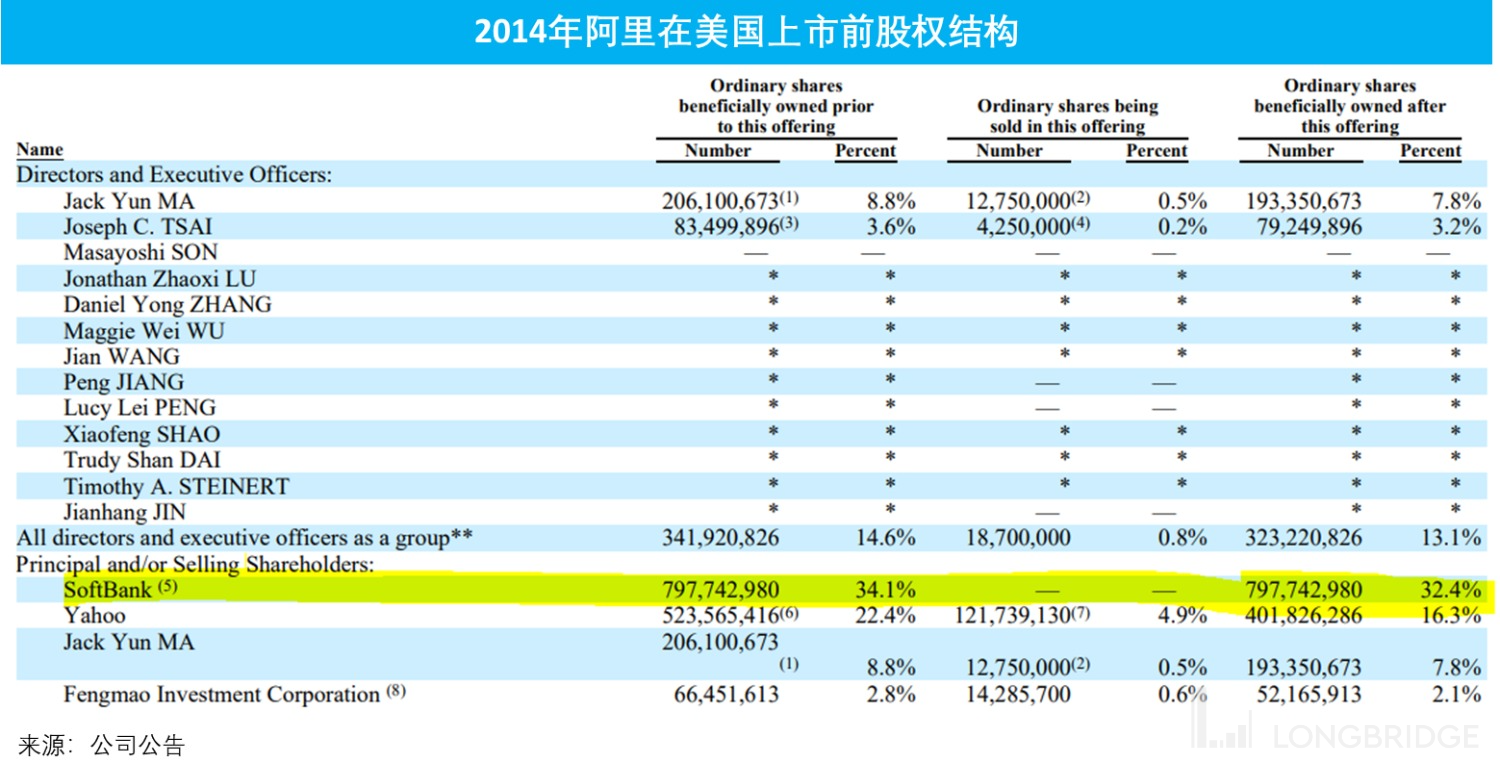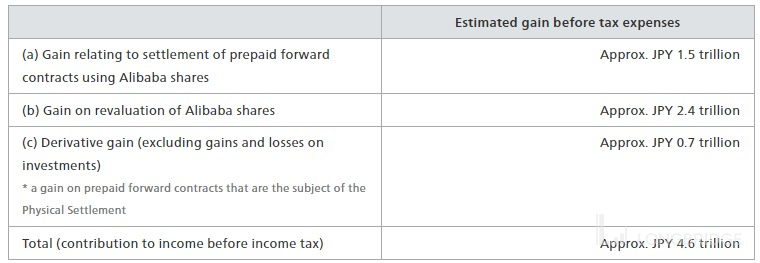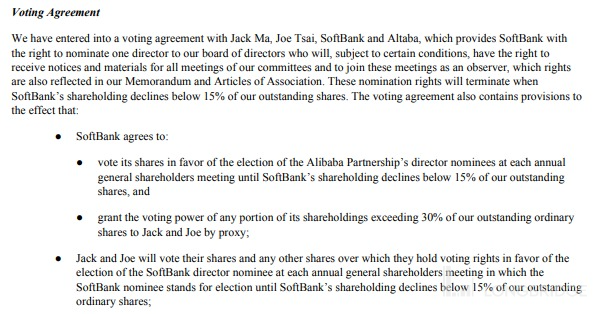Softbank and Alibaba have gone their separate ways, haven't they?
On August 10th, SoftBank announced that it planned to reduce its total stake in Alibaba by 10%. This news undoubtedly worries some investors. In yesterday's briefing, the Dolphin Analyst expressed the view that this reduction in itself will not immediately cause pressure on Alibaba's public market. However, in the long run, this reduction in stake may mean that SoftBank and Alibaba will completely go their separate ways. In light of this, the Dolphin Analyst has reviewed SoftBank's entire investment process in Alibaba, from its initial investment to its massive sell-off of Alibaba, to help you judge whether Alibaba will continue to be sold in the future.
1. 2000-2015: SoftBank Recognizes Alibaba and Accompanies Its Growth
The deep roots between SoftBank and Alibaba can be traced back to the beginning of Alibaba. In the early financing of Alibaba in 1999, apart from the initial USD 5 million "angel round financing" led by Goldman Sachs, SoftBank did not participate. In the second and third rounds of financing, SoftBank decisively invested USD 20 million and USD 80 million as lead investor in Alibaba, almost accounting for the entire amount of the second and third rounds of financing. (When Yahoo invested USD 1 billion to acquire Alibaba later, Yahoo's net amount was about USD 18 million after deducting the original shares of a total of USD 18 million purchased from SoftBank. Therefore, SoftBank's net investment in Alibaba was about USD 82 million.)
Although SoftBank's presence did not appear in subsequent rounds of financing, with the rapid growth of Alibaba's scale and valuation, subsequent investors who invested billions of dollars still could not take over the proportion of shares that SoftBank obtained from the initial investment of more than $80 million.
Therefore, relying on early and strong bets, SoftBank became Alibaba's largest shareholder, holding approximately 34% of Alibaba's shares with a total of 797 million shares, by the time Alibaba was listed in the US in 2014. And until SoftBank's first sale of Alibaba shares in 2016, the number of these 797 million shares had never changed.
2. 2016, the first slight reduction in Alibaba, still holding warm sentiment
During the 16 years since SoftBank invested in Alibaba in 2000, SoftBank had never actively reduced its stake in Alibaba. However, in June 2016, SoftBank announced it would reduce its total stake in Alibaba by USD 8.9 billion to obtain funds. After the reduction, SoftBank's stake in Alibaba decreased from 32.4% to 29.2%, and the total number of Alibaba shares held by SoftBank decreased from 797 million to 747 million.
- USD 2 billion in shares were repurchased by Alibaba itself.
- USD 400 million of shares were repurchased by Alibaba's partners. 3.5 billion US dollars were sold to GIC (Singapore's sovereign wealth fund), and another 500 million US dollars were sold to Temasek.
The remaining $5.5 billion in Alibaba shares will be transferred to a trust company established by SoftBank and financed by selling trust units to investors (with ownership of Alibaba shares also transferring to the unit holders).
Although this marks the beginning of SoftBank's reduction of Alibaba equity, it is likely that the reduction was a result of negotiations between SoftBank and Alibaba rather than an independent decision by SoftBank, as Alibaba and SoftBank's partnership remains strong, evident in the fact that a quarter of the cuts were bought back by Alibaba and Alibaba partners.

Three, 2019-2021, Frequent Reductions, Cracks in the SoftBank-Alibaba Alliance
Fast forward to June 2019, when SoftBank again announced it had sold 7.3 million Alibaba shares, reducing its total stake in Alibaba from 746 million to 673 million. Similar to the cut that took place in August of this year, the cut in June 2019 was part of a forward deal signed as far back as June 2016 (the last round of cuts), which was finally settled three years later, transferring ownership of Alibaba shares. Finally, the real start of the SoftBank-Alibaba cuts began.

By the middle of 2020, the outbreak of the COVID-19 pandemic had led to a net loss of JPY 9.616 billion (nearly $90 billion USD) for the SoftBank Group in the fiscal year ending March 31, 2020. Faced with massive losses, Masayoshi Son announced on the earnings call that he would sell approximately $11.7 billion of Alibaba shares to repurchase SoftBank Group's own shares. Following the announcement of the sell-off, both Son and Jack Ma announced that they would resign as directors of Alibaba and SoftBank Group, respectively. In retrospect, this event actually signaled that SoftBank and Alibaba were about to go their separate ways.
However, although Son announced as early as 2020 that he would sell approximately $12 billion in Alibaba shares, according to the FY21 Alibaba annual report, as of July 2021, SoftBank still held 673 million Alibaba shares, none of which had been sold. Thus, SoftBank most likely sold the Alibaba shares through a forward contract, but the ownership of the shares remained in SoftBank's hands.
It wasn't until Alibaba released its financial results in 2022 that as of July 15, 2022, SoftBank's holding of Alibaba shares fell from 673 million to 633 million, and its holdings fell to 23.9%. In other words, SoftBank completed its sale of 40 million Alibaba shares, or about 1.5% of its holdings, between July 2021 and July 2022 (the shares sold during this period have already been settled). However, no disclosure of this round of reduction was seen in the announcements of Alibaba and SoftBank Group by the Dolphin Analyst. Therefore, Dolphin Analyst believes that SoftBank may have completed this round of reduction through multiple transactions, so it is not mandatory to disclose.
4. In 2022, throwing away 10% of Alibaba shares, will SoftBank and Alibaba part ways?
On August 10th this year, SoftBank once again announced that it will advance delivery of forward contracts for sale of Alibaba shares. The contract involves a total of 242 million shares of Alibaba, which can contribute approximately $34 billion in profit to SoftBank's financial report. After this reduction, SoftBank's equity in Alibaba will drop from 23.7% to 14.6%. (It is worth noting that in the Alibaba Annual Report issued on July 15, SoftBank still held 23.9% of Alibaba's shares, which indicates that SoftBank has reduced its shares in Alibaba by about 0.2% from July to August when the announcement was made.)
Dolphin Analyst believes that this huge reduction of nearly 10% of Alibaba's total shares will not immediately cause Alibaba's stock to be sold off in the open market. The reasons are as follows:
1. This statement does not refer to the new reduction of Alibaba shares, but only to the delivery of previously signed contracts
The transaction mentioned in this announcement is the forward contract for the sale of Alibaba shares that has been signed earlier, rather than a decision to reduce Alibaba's shares anew. SoftBank has already signed contracts with several financial institutions to sell Alibaba shares at a certain price (Dolphin Analyst estimates the price to be $112-113/ADR) to obtain funds. This announcement only indicates that SoftBank will officially transfer the ownership of Alibaba shares to the institution that takes over.
According to the announcement, the transaction will generate $34.1 billion in profit on SoftBank's income statement, mainly consists of three parts:
a. The first part of the profit of 150 million yen (US$1.11 billion) comes from the reassessment of the value of Alibaba's shares sold in this transaction. It equals the difference between the current price of Alibaba's shares at the time of the announcement, which is $91.19/ADR, and the book cost of Alibaba's shares on SoftBank's asset statement, which is $43.97/ADR, multiplied by the number of shares of 242 million sold in this reduction.
b. The remaining 388 million shares of Alibaba's shares held by SoftBank after the reduction will also be revalued from the book value of $43.97/ADR to the current price of $91.19/ADR, generating a profit of 2.4 trillion yen ($1.78 billion).
c. The profit from the forward contract settlement of 700 billion yen (US$5.19 billion) generated by this transaction is equivalent to the agreed delivery price when signing the contract minus the current price of Alibaba's shares, which is $91.19/ADR, multiplied by the 242 million shares traded. Therefore, it can be calculated that the profit per share of the forward contract settlement is $21.4/ADR, and the agreed delivery price of this forward contract is approximately $112.6/ADR.

2. This delivery itself will not cause selling pressure in the public market, but it depends on the choices of the recipient institutions in the future.
There are several reasons: Firstly, this reduction of shares and delivery is not accomplished by selling in the public market, but among SoftBank and a group of rival financial institutions. Alibaba's shares were only transferred from SoftBank, a major shareholder, to multiple institutions.
Secondly, Alibaba's shares will not be delivered in full on August 10th, but will be gradually delivered through SoftBank's subsidiary entities from mid-August to the end of September.
So, will the recipient institutions immediately sell Alibaba's shares after receiving them? Not necessarily. According to the announcement, when signing the forward contract for selling Alibaba's shares, the institutions that will receive Alibaba's shares have already hedged this transaction through different channels.
For example, the recipient institution can hedge its long position in Alibaba's shares by short selling Alibaba's stocks, or by buying bearish Alibaba futures/options. In other words, the recipient institution has established a bearish position in Alibaba's shares when signing the forward contract. Therefore, after this delivery, the recipient institution will only close the long and short positions of Alibaba's shares without creating new bearish positions in Alibaba.
Five, will Alibaba continue to be sold in the future?
1. From the perspective of this transaction alone: After this delivery is completed, Alibaba's equity will be dispersed to numerous institutions from SoftBank, the single major shareholder. Therefore, whether or not to sell Alibaba's shares in the public market will be decided by the institutions that receive Alibaba's equity.
In theory, after Alibaba's equity is dispersed, the chances of it being sold will indeed increase. Because when SoftBank, as the major shareholder, reduces its shares, it is subject to various restrictions and must disclose information. After the equity is dispersed to various recipient institutions, it will be easier and more convenient for these institutions to sell Alibaba's shares.
However, considering Alibaba's current price of less than 90 USD/ADR, Dolphin Analyst believes that the recipient institutions are unlikely to make a wise choice to sell Alibaba's shares at a "losing cabbage price". But if Alibaba's stock price rebounds significantly, it is uncertain whether the recipient institutions will sell Alibaba's shares at a reasonable price.
2. Will SoftBank continue to sell the remaining 14.6% of its Alibaba shares? At present, it is difficult for Dolphin Analyst to judge whether or not SoftBank intends to continue to sell its Alibaba shares. However, according to the agreement between SoftBank and Alibaba earlier, after SoftBank's equity stake falls below 15%, SoftBank will lose the independent right to nominate Alibaba's directors. At the same time, in board elections, Softbank and Alibaba partners no longer need to unconditionally support the other party's nominated director candidates.
In addition to the management aspects of the separation, when SoftBank's equity stake falls below 15%, SoftBank will no longer record Alibaba's equity using the equity method on its balance sheet, but instead will convert it into a simple financial investment (security investment). In addition, according to the disclosure at Softbank's performance meeting in 22nd year, as of June this year, Softbank has mortgaged 53% of its holdings in Alibaba. The part announced for delivery reduction this time accounts for only 38.4% of the Alibaba shares held by Softbank, and another 15.6% of the Alibaba shares held by Softbank have been mortgaged out. Considering that in history Softbank generally sold Alibaba shares through derivative contracts and other derivatives without disclosing changes in shareholding until formal delivery. Therefore, it is possible that some of the remaining Alibaba shares held by Softbank have already been sold, but have not yet been delivered.
Overall: Although whether Softbank will continue to reduce its holdings in Alibaba in the future depends mainly on its funding needs, it can be said that there is no more "personal relationship" between Softbank and Alibaba due to Softbank's loss of influence in Alibaba's management and the transformation of its investment nature. Once there is a funding need, selling Alibaba stocks and withdrawing funds will be a simple, effective, and financially burden-free choice for Softbank. Therefore, the Dolphin Analyst has to pessimistically point out that Alibaba will continue to face the pressure and risks of major shareholder reductions in the future.

Risk disclosure and statement of this article: Dolphin Disclaimer and General Disclosure









